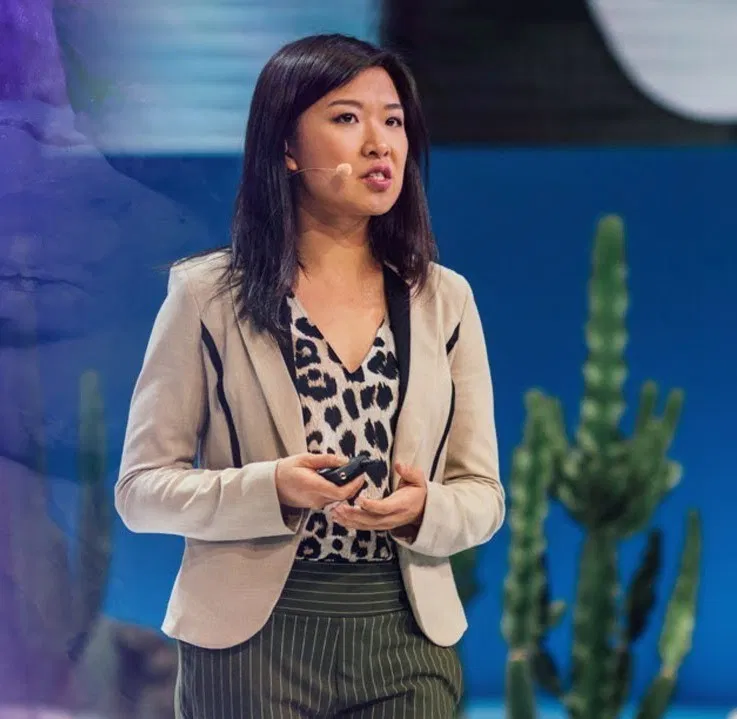
Dr. Diane Wu is the co-founder and CEO of Trace Genomics, a technology that uses DNA sequencing and machine learning to deliver an accessible microbiome test for farmers, enabling improvements in soil health, nutrition, and sustainability.
Education
Dr. Diane Wu was born in 1987. She graduated from Simon Fraser University, with a Bachelor’s degree in Computer Science (4.14) and Molecular Biology, and Biochemistry (4.33) in 2008. At the age of 25, Dr. Wu earned her Ph.D. in Genetics from Stanford University in 2012. She developed novel computational approaches to nucleic acid analysis. She built genetic sequencing libraries as diagnostics to capture cell states, environmental signatures, and the gut microbiome. Dr. Wu also received a Nobel Prize for Physiology or Medicine for the discovery of RNAi in 2006. Dr. Wu also attended Stanford School of Business for Entrepreneurship in 2012.
Early Career
In January 2006, while Dr. Wu was still at SFU, she became a Bioinformatician and improved computational methods for orthologous gene prediction. In June of the same year, she joined Child and Family Research Institute at the University of British Columba as a Research Scholar. Dr. Wu was responsible for modeling techniques for improvement of transcription factor binding site prediction.
After CFRI, Dr. Wu joined the Natural Sciences and Engineering Research Council at Simon Fraser University. Dr. Wu was responsible for the validation of novel predicted genes in Pseudomonas aeruginosa. In September 2007, Dr. Wu became a Research Scientist at BC Cancer Agency – Genome Sciences Centre. As a Research Scientist, Dr. Wu worked for high-throughput sequence analysis of molecular signatures from clinical samples, incorporating CNV, cDNA microarray, and genomic structure data to identify causative factors for an inherited disease, and developed algorithms for detection of miRNA editing.
In June 2010, Dr. Wu worked as a Science Communicator at The Tech Museum. Dr. Wu demonstrated science for visitors of the museum. In January 2013, she became a Fellow at Insight Data Science, where she built a recipe search app that utilizes graph analysis to organize recipes by ingredient, gathered over 100,000 recipes based on the Jaccard distance of ingredients (calculated using MapReduce on Amazon EMR), labeled clusters using the n-gram analysis, and identified ingredient differences using log-2-ratios of vector representation.
In April 2013, Dr. Wu joined Palantir Technologies as a Data Scientist. She developed business analytics reports for leadership, gaining insight into customer retention and growth metrics. Dr. Wu also developed log analysis scripts for engineering to understand bug reports and triage sources of product failure. In October 2013, Dr. Wu got promote to a Software Engineer in Machine Learning. Her role was to developed predictive analytics solutions for enterprise clients across a range of verticals, including geo-temporal crime prediction, customer analytics product for small merchants, health care fraud prediction and triage, and merchandising prediction for a large Japanese convenience chain. Dr. Wu worked with clients in the US and Asia to turn new opportunities into multi-year contracts.
In October 2014, after working at Palantir Technologies, Dr. Wu became a Senior Data Scientist. Dr. Wu joined the company as employee #10 while incubating at Khosla Ventures. Dr. Wu took on product management, business development, and backend engineering roles. Dr. Wu led the product development of medical imaging product and helped to win a critical contract with Virtual Radiology group. Dr. Wu implemented deep learning algorithms (Python) for natural language processing for entity-based sentiment analysis and led the development of customer-facing predictive solutions on the MetaMind platform, including intracranial hemorrhage.
Trace Genomics
In January 2015, Dr. Wu and Poornima Parameswaran, who met at Stanford while working in the lab of Dr. Andrew Fire, co-founded Trace Genomics. Trace Genomics makes soil information more easily attainable by doing NPK testing and evaluating information. Dr. Wu launched Trace Genomics on the belief that soil science should be accessible for people to make decisions. Soil testing at the DNA level initiated a new course of data that had never before been accessed at scale—the technology was limited to a research environment.
Dr. Wu and Parameswaran changed that and brought soil DNA sequencing to every farmer, agronomist, and stakeholder working with soil. They took science out of the lab and into the field and translated soil DNA into actionable insights. Trace Genomics is an interdisciplinary team of data scientists, bioinformaticians, molecular biologists, and software engineers, working together to serve the farming community and help growers maximize the value of every acre.
Funding rounds
In July 2016, Trace Genomics raised $4 million in a seed round from lead investors Refactor Capital and Fall Line Capital, with the participation from Viking Global Investors and Illumina Accelerator. In February 2017, Trace Genomics raised $2 million in a convertible note from SVG Ventures. In November 2018, Trace Genomics raised $13 million in a Series A round, led by Stage 1 Ventures. In June 2019, Trace Genomics secured $3 million in equity investment, led by S2G Ventures. During this round, FoodShot Global, the multistakeholder investment platform, has announced the winners of its first challenge, Innovating Soil 3.0, which the Trace Genomics received $535,000 in grant funding to three research initiatives under its Groundbreaker Prize.